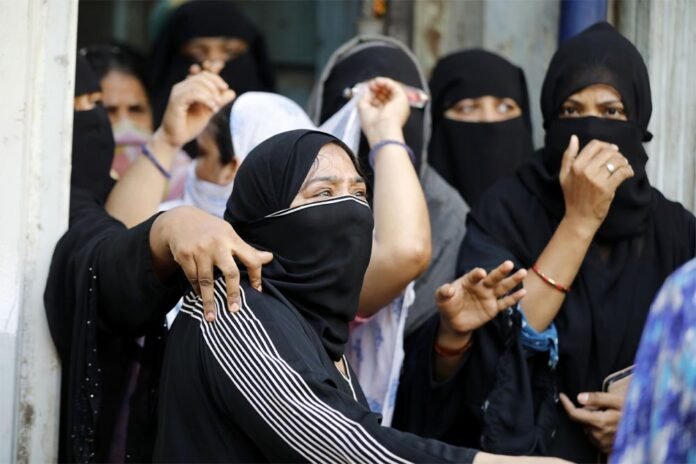This new ban by the Taliban prevents women from singing in public, also prevents reciting poetry or reading aloud as their voice has to be ‘body’s’intimate’ The Taliban order, to be implemented in late August, is one of many attacks on freedom. Women now have totempt’ To avoid this, you should always cover your entire body with thin, not small or tight, That includes covering their faces.
For the past few years, racial conflicts have intensified between the local population of Europe and the Muslims who have migrated from outside. These conflicts have now become bloody and destructive. Many countries are now imposing strict restrictions on Muslims. There is a demand to expel them from the country. Their mosques, which have become a refuge for terrorists, are being demolished with bulldozers. Restrictions are being imposed on them keeping beard and wearing burqa.
This is happening because wherever Muslims settle, they want to implement their own Sharia law. And that too is not the same. They oppose the local culture and religion there. They live by creating their own identity. They do not mix with the local culture. Although all Muslims are not the same. But those who are extremists influence most of the Muslims. Due to which hatred for every Muslim starts developing.
It is another matter that countries like England, France, Holland, Portugal have created an anti-Muslim atmosphere. These are the countries that kept most of the world as slaves till the last century and imposed their culture and religion on them. But today they do not remember the grave sins they have committed.
But this does not mean that Muslims should do the same thing that the British, Portuguese, French and Dutch did to their ancestors. Because in today’s context, the behavior of Muslims has become a cause of concern in many countries. Their aggression and archaic fanatic thinking is completely opposite to modern life. Therefore, the problem is becoming more complicated.
It is not that their fundamentalist behaviour is being opposed only in the countries that stand against them. Even in Muslim countries, peace-loving people are troubled by the dictatorship of their fundamentalists. Take the example of the women of Afghanistan. The strict restrictions imposed on them have mentally frustrated these women. They are constantly falling prey to mental illnesses. When the Taliban introduced a law last month essentially banning women’s voices in public, the world was shocked.
But those who live under the regime in Afghanistan were not surprised by the announcement. Speaking to an international news agency, a woman living there said, “Every day we expect a new law. Unfortunately, every day we expect a new, restrictive law for women. Every day we are losing hope.”
For this woman, such action was inevitable. But for her and many women like her, being mentally prepared for such decisions did not lessen the damaging effect on their mental health. This new restriction by the Taliban also prevents women from singing, reciting poetry or reading aloud in public as their voice is considered an ‘intimate’ part of the body. This Taliban order, to be implemented at the end of August, is one of many crackdowns on freedom.
Women must now cover their entire body at all times with clothing that is not thin, short or tight, including covering their faces, to avoid ‘temptation.’ Publishing photos of living beings and viewing photos or videos of them on a computer or phone is also banned, putting the fate of Afghanistan’s media outlets in grave danger.
Recording women’s voices and then broadcasting them outside of private homes is also prohibited. This means that the women who recorded their interviews or chose to speak with a news agency via voice notes did so at great risk. But despite the possibility of severe punishment, they said they were not willing to remain silent. Through the interviews they gave to this agency, they want the world to know the brutal, dark reality of life as a woman in Afghanistan.
Most of the women interviewed wished to remain anonymous for fear of inhumane punishment. But Sodaba Noorai from Kabul was unique – she wished to be named without fear of punishment. In a voice message to the news agency, she said, “Despite the ban on women speaking publicly, I decided to talk to you because I believe it is important to share our stories and raise awareness about our struggles.
Revealing my identity is a huge risk, but I am willing to take it because silence will only allow our suffering to continue. This new law is extremely worrying and has created a climate of fear and harassment for women. It restricts our freedom and it undermines our rights to education, work and basic autonomy.”
It is noteworthy that Sodaba Noorai lost her job in August 2021. Because then the Taliban rule was re-established there and many restrictions were imposed on women according to Sharia law. Now she receives an amount equivalent to $ 107 per month from the government, which she considers insufficient to meet the basic needs of women.
These women want the international community to urgently develop and implement a strong, coordinated and effective strategy to pressure the Taliban to make these changes. This Taliban order shows how the Taliban’s violation of one right can have a devastating impact on the exercise of other rights.
Overall, the Taliban’s policies create a system of oppression that discriminates against women and girls in Afghanistan in almost every aspect of their lives. That’s why the whole world needs to unite against such oppressive orders.

